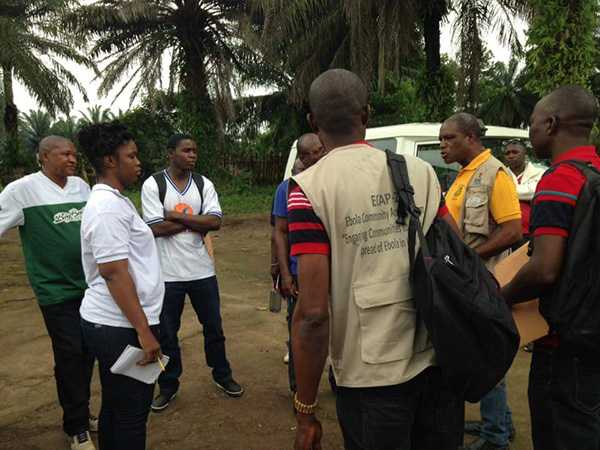Liberia Workforce Development (FETP) in Action
The Bottom Line
THE CHALLENGE: Disease detectives are critical to investigating and stopping the global spread of dangerous diseases like Ebola. But in 2014, Liberia had very few trained disease detectives.
THE SOLUTION: CDC’s Frontline Field Epidemiology Training Program helped train 74 disease detectives in Liberia since 2015 and will have trained 115 by the end of 2016. These new disease detectives are helping to prevent the spread of disease and saving lives.

A mentor provides technical oversight for disease detectives trainees during a measles
Frontline Disease Detectives: Putting Training to Work
LIBERIA— In 2014, Liberia lacked an adequate number of field epidemiologists and had to rely on international help to battle the world’s largest Ebola epidemic. Without enough trained field epidemiologists, or disease detectives, to track down every single case of Ebola the country struggled to stop the virus from spreading. Much has changed since those trying times, including CDC and partners providing support to the Liberia Ministry of Health to launch the country’s first Field Epidemiology Training Program or FETP.
FETP trains field epidemiologists around the world, giving them the skills to collect, analyze, and interpret data to make decisions that can save lives. To keep the world safe from devastating diseases like Ebola, well-trained disease detectives are needed in every country to detect and contain diseases before they spread. Advanced FETP training requires 2 years, but an intense 3 month course, called “Frontline”, provides trainees with the key disease detection and response skills necessary to manage disease threats early.
Kleeker Jukoryan completed the first FETP Frontline training in Liberia and it paid off immediately. In November 2015, as his group was graduating, there was a resurgence of Ebola cases in Monrovia, Liberia’s capital city and home to 30% of the population. As the Montserrado county surveillance officer, Kleeker led contact tracing for the outbreak. Contacts of confirmed Ebola cases were quickly identified and closely monitored, and the outbreak was stopped in its tracks.
In 2014, when Liberia had very few trained disease detectives, Ebola was able to spread unchecked through Monrovia, sickening and killing many. Thanks to the efforts of Liberia’s FETP Frontline training, there were 74 trained frontline disease detectives located throughout Liberia by September 2016—and by the end of 2016, Liberia will have a total of 115 FETP frontline trained staff, covering all 15 counties and 92 health districts.
Since the FETP Frontline program was launched, county and district surveillance officers across Liberia have also been able to spring into action to detect diseases such as whooping cough and measles, and prevent further spread of infection. Dr. Maame Amo-Addae, FETP Resident Advisor and an FETP graduate from Ghana, has seen FETP Frontline graduates in almost every county in Liberia contain individual cases of diseases before they could turn into outbreaks.
As evidenced in Liberia, investigation and rapid response by disease detectives saves the lives of people directly affected by an outbreak. It also protects the lives of people throughout the rest of the world, where diseases like Ebola can easily spread. If Ebola strikes again in his community, disease detectives like Kleeker will be on the front lines, working to stop it in its tracks.
About This Story
CDC is working with 31 priority countries to develop global health security capabilities, which protect Americans and people around the world from disease threats. This story illustrates Liberia’s commitment to:
- Workforce Development: Expand the pool of skilled healthcare staff who can prevent, detect, and respond to outbreaks to keep a country and the world safe from diseases.
Liberia’s expansion of their Field Epidemiology Training Program (FETP) moves the country towards building a cadre, or team, of disease detectives to investigate and contain outbreaks close to the source and prevent them from turning into local or global epidemics.
- Page last reviewed: December 23, 2016
- Page last updated: December 23, 2016
- Content source:
Global Health
Notice: Linking to a non-federal site does not constitute an endorsement by HHS, CDC or any of its employees of the sponsors or the information and products presented on the site.


 ShareCompartir
ShareCompartir